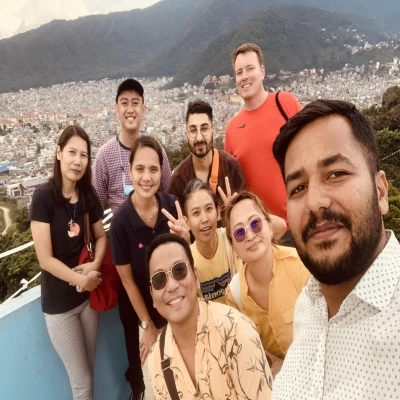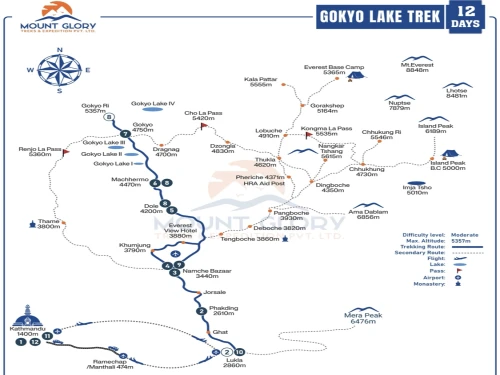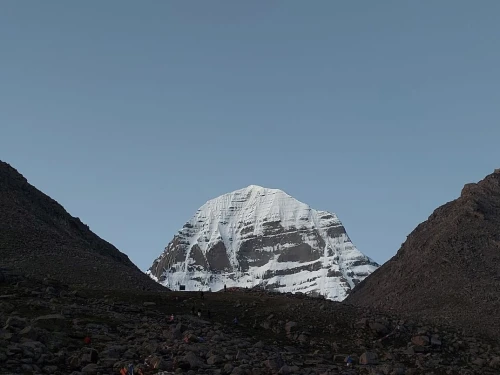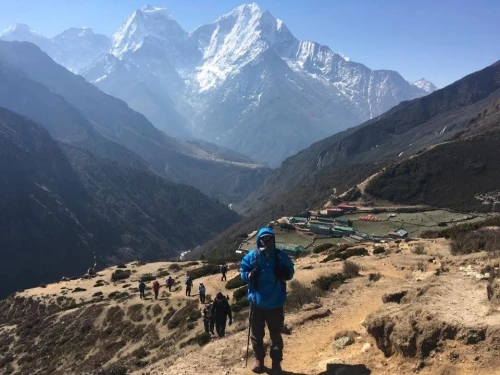Where are the Majestic Himalayas located?
The Himalayas are a huge part of Asia. They are a colossal natural barrier that divides the Indian subcontinent from the Tibetan Plateau. It is 2,400 km (1,500 mi) long and runs through Nepal, India, Bhutan, China (Tibet Autonomous Region), and Pakistan. The world’s top two mountains, Mount Everest, which is 8,848.86 meters, and the third highest, Kanchenjunga, plus some of the most recognized peaks, are part of the entire alpine mountain range. They’re accompanied by countless other rough and jagged snowy summits, wildly glaciated valleys, and cobalt gorges on rivers that make the Himalayas just a genuine natural phenomenon.

Among all the countries in which the Himalayas touch, Nepal is often referred to as the Heart of the Himalayas. Very importantly, this is the only country to have eight of the world's fourteen peaks above 8,000 meters, and this too with easy access through established trekking trails and culturally rich mountain villages. Indeed, the rarest combination of nature in grandeur and adventure in mountain climbing makes Nepal one of the most visit-worthy places in the world for trekkers and climbers.
Why is Nepal the best destination for Himalayan treks?
The trekking craze has made Nepal well known as the Trekkers Paradise because, in the Himalayas, there is no end to what the trekkers may expect Nepal to place in front of them. It is a heady mix of the high peaks, luxury, and beauty of the place, and the warm hospitality—the ultimate Himalayan destination for any kind of adventure.

Home to the World's Highest Mountain
Seven of the world’s top eight highest peaks, including the giant Mount Everest, stand tall in Nepal, dwarfing everything else in such an impossibly tiny country, and making possible the creation of those most popular trekking regions anywhere.
Treks That Are World-Famous
From the renowned Everest Base Camp Trek to the ever-popular Annapurna Circuit, you will be spoiled by the choices with a range of trek options satisfying every kind of trekker. Whether you are a beginner or an experienced mountaineer, you will receive a trek according to your needs. It varies in terms of difficulty, scenery, and culture, with the easier treks such as Langtang Valley and Mardi Himal, Manaslu Circuit, and the more challenging ones such as the Three Passes Trek.
Cultural Wealth and Spiritual Estate
Not just a trip among mountains, trekking in Nepal is in itself a way of preserving ancient tradition and culture. The juxtaposition of high monasteries and areas set out by colorful prayer flags and highland settlement areas gives a quick view of a way that is completely holy, intermingled with the Himalayas. The Buddhist and Hindu influences all the way along the trails increase the spiritual dimension associated with each.
Biodiversity and Natural Beauty
Nepal stands as an eastern part of the Himalayas hotspot for rich biodiversity, including some rare wildlife such as the snow leopard, the red panda, and the Himalayan monal (danphe)-most of which inhabit it. The scenery varies from alpine meadows covered with rhododendron forests to glacial rivers and high mountain deserts. Each trek unfolds a myriad folds of God's artistry in nature.
Accessibility and Infrastructure for Trekking
Trekking in Nepal is not only possible; it is safe as well because of all the infrastructure that the tourism industry has developed around trekking guides, porters, tea houses, and means of transportation. Most, if not all, trekking centers such as Lukla, Pokhara, and Syabrubesi serve as entry points to the trails and have been further enhanced by a solid network.
Year-round Trekking Destination
There are basically two main trekking seasons in Nepal: spring, or March to May, and autumn, or September to November. Yet, there can still be great opportunities for trekking above these two peak times. Ghorepani Poon Hill and Helambu are great examples of low-altitude trekking during winter.
Top Trekking Routes in the Nepal Himalayas
The majority of hikes in the Himalayas take place in Nepal, as this country boasts the best trekking routes in the entire Himalayan region. Each type of trekking, from the challenging passes at high altitudes to the easy and culturally rich village trails, caters to a specific type of trekker. Below are the most popular and worthwhile Himalayan treks in Nepal that you should consider:

Everest Base Camp Trek
The Everest Base Camp Trek is an iconic route with beautiful Sherpa villages. You’ll hike along high pathways high above rivers and cross swinging suspension bridges. You’re trekking among towering glaciers toward the tallest peak in the world — Mount Everest. If you are looking for some serious Himalayan action, this trek is a good pick.
Annapurna Circuit Trek
Annapurna Circuit is a popular trek that circumnavigates the range. This adventure has a mix of terrains, burning green tropics, dry deserts, deep valleys, and snow-capped mountain views. Along the way, you’ll traverse through Thorong La Pass, one of the world’s highest trekking passes. It’s a long walk, but the rewards are great.
Trek to ABC (Annapurna Base Camp)
The Annapurna Base Camp Trek brings you to the very center of the Annapurna range. You’ll walk through delightful local villages, through forests, and ascend staircases that take you up to the foot of the beautiful Annapurna peaks. It is shorter than the Annapurna Circuit but offers spectacular mountain views, albeit in a compressed time frame.
Mardi Himal Trek
The Mardi Himal Trek is a lesser known and shorter trek on the Annapurna region. It is an excellent choice if you enjoy quietness and less “crowded” environment.” The path rises along a ridge with awesome views of Machapuchare (Fishtail Mountain) and the Annapurna range.
Ghorepani Poon Hill Trek
Poon Hill Trek is one of the easy and scenic trek in Nepal. That’s great news if you’re just starting out on your workouts, or if you have less time to allocate to your fitness routine. The best part is you get to view the sunrise from Poon Hill and the mountains glow with golden colors. You’ll hike through lovely forests lush with rhododendron flowers, too.
Langtang Valley Trek
Langtang Valley is near Kathmandu and offers a real mountain trekking feel without having to venture out too far. You’ll stroll through tranquil villages, woods, and hit the valley encircled by snow-covered peaks. It’s the perfect choice for people looking for a shorter Himalayan adventure, but with plenty of scenery along the way.
Manaslu Circuit Trek
The Manaslu Circuit is further off the beaten track than others, so it is wilder and less visited. You’ll trek through Tibetan-style villages and cross a high mountain pass, Larkya La. It’s ideal if you are after an off-the-beaten-path experience with perfect views and fewer trekkers.
Gokyo Lake Trek
The Gokyo Lake Trek is a journey to a magical land of blue glacial lakes. You’ll also hike up to Gokyo Ri for some of the best mountain views, even better than certain Everest viewing points. It’s a more tranquil supplement to the Everest Base Camp route, no less beautiful.
Everest Luxury Trek
This EBC luxury trek allows you to experience some of the best of the Everest region in comfort. You’ll overnight in top-quality lodges, eat great food, and stroll at a leisurely pace. It’s the ideal option if you’re looking to see spectacular views of Everest and the other surrounding mountains, without roughing it up in regular trekking conditions.
Tips for Trekking in the Nepal Himalayas
Trekking in the Himalayas is likely to be the adventure of your life. But to do so takes planning, preparation, and an understanding of the space you’re within. (Name of person), may it be an amateur or a professional trekker, abiding by these simple rules would only make a trek safer, easier, and an adventurous voyage.

- First and foremost: select a trek that matches both your fitness level and the time you have available for trekking, along with your trekking experience.
- Before planning, you always make sure to check the best seasons for trekking. The autumn (September to November) and the spring (March to May) seasons are most suitable.
- Drink a lot of water and go up slowly to avoid altitude sickness; don’t skip acclimatization days.
- Take a certified guide or a porter with you for safety, support, and local impact reasons; this is particularly important for longer duration treks or high altitude treks.
- Trekking permits are different for different regions - Include the required trekking permits like TIMS, ACAP, Sagarmatha National Park entry, etc.
- Travelling light, layered, including a down jacket, a rain cover, and metal for mountain weather.
- Bring simple first aid, altitude medicine such as Diamox, and your personal hygiene products.
- Respect local culture and protect the environment with eco-friendly practices; avoid plastics on trailways.
- Get travel insurance that covers high-altitude trekking and emergency helicopter evacuation.
- Mentally prepare yourself for unpredictable weather, the most basic form of accommodation, and connectivity.
In Conclusion

Nepal is the center of the Himalayas, with a variety of trekking experiences for every kind of adventure seeker, such as you. Whether you want to conquer the Everest Base Camp or take a soothing walk along the Annapurna Circuit, Nepal has some unforgettable experiences lined up for you. Mount Glory Trek is here to make your overall trekking experience one with no comparison. So, with expert guides, personalized itineraries, and all minor details considered, you can be sure that your Himalayan journey will be spectacular.
All set to start on the best adventure ever? Contact Mount Glory Treks now and select the best trekking package that suits your Himalayan dream trek!



 4 reviews
4 reviews









